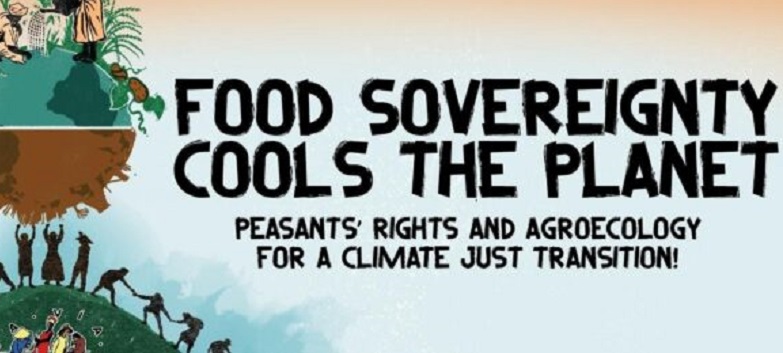
The current climate crisis is undeniably part of the ongoing multidimensional crisis of the neoliberal system: a system that sacrifices environmental balances and ecosystems for the short-term profit of dominant minorities, particularly the transnational agribusiness.
In the face of this, advocacy efforts are being made at international level to counter the devastating effects of this crisis and to demand the introduction of alternatives centered – among other things – on the promotion of peasant agriculture, food sovereignty and the rights of peasants. The latter is bulwark against the climate crisis and a solution for establishing socially and ecologically sustainable food systems.
The mobilization of rural organizations and their allies to draw up the UN Declaration on the Rights of Peasants and Other People Working in the Rural Areas (referred to as the Declaration henceforth) indicates a desire to appropriate international mechanisms to serve local rural struggles. Following the historic victory represented by the adoption of the Declaration by the UN General Assembly in 2018, a new stage has been reached: the Declaration must now be promoted and effectively implemented as a common roadmap for developing fair and environmentally-friendly sustainable agricultural systems.
On 27 June 2023, Alberto Silva, secretary of the Swiss peasants’ organization Uniterre, a member of La Via Campesina, and a vegetable farmer, spoke at the plenary session of the 53d session of the Human Rights Council during the interactive dialogue with the UN Special Rapporteur on Climate Change. In his speech, Alberto stressed that, in the face of the harmful climatic effects of this crisis, peasants are a shield and a solution, thanks to their agroecological practices, which have already proved to be more resilient than industrialized systems.
The Uniterre representative underlined the Declaration’s potential as a vehicle for the “transition to sustainable, diversified agriculture that creates jobs and is resilient in the face of the challenges posed by the climate crisis”. The world peasants’ movement is now calling for the creation of an international mechanism to follow up the Declaration (a special procedure on peasants’ rights), which will serve as a space for dialogue and promotion, and which will make it possible to generate international support for peasant and climate struggles on the ground.
On 29 June 2023, during the interactive dialogue with the UN Special Rapporteur on Extreme Poverty, another representative of La Via Campesina addressed the plenary session of the Human Rights Council. In his intervention, Diego Monton, Argentinian peasant from MNCI Somos Tierra – / Unión de Trabajadores Rurales Sin Tierra, stressed that the fight against poverty inevitably involves implementing the measures set out in the Declaration, in particular agrarian reform as a guarantee of fair access to land. The increasing concentration of land in the hands of large landowners is one of the main causes of poverty in rural areas, as peasants lose access to their main means of production and livelihood.
For Diego Monton, any employment plan aimed at reducing inequalities and fighting poverty “should be linked to agrarian reform policies that guarantee access to land for peasants, as well as to the financing of peasant cooperatives to achieve the valorisation of agricultural products in the rural communities themselves and their access to the market at a fair price”.
Finally, on 3 July 2023, Murad Akincilar, CETIM representative, also addressed the plenary of the Human Rights Council during a Thematic Panel entitled “Negative impacts of climate change on human rights, in particular on the right to food”. In his speech, Mr Akincilar reiterated the importance of Article 16 of the Declaration, which states that all public policy should give greater support to local markets based on local peasant production. Strengthening these markets with a view to building peasant cooperatives based on agroecological practices is a realistic and viable solution to climate injustice.
Efforts to tackle the climate crisis through the much-herald “ecological transition” run the risk of being in vain if they are not accompanied by support for peasant farming practices, which are the fruit of thousands of years of experience and traditional knowledge aimed at achieving a balance between food production and natural cycles.
Read Alberto Silva’s statement (in French)